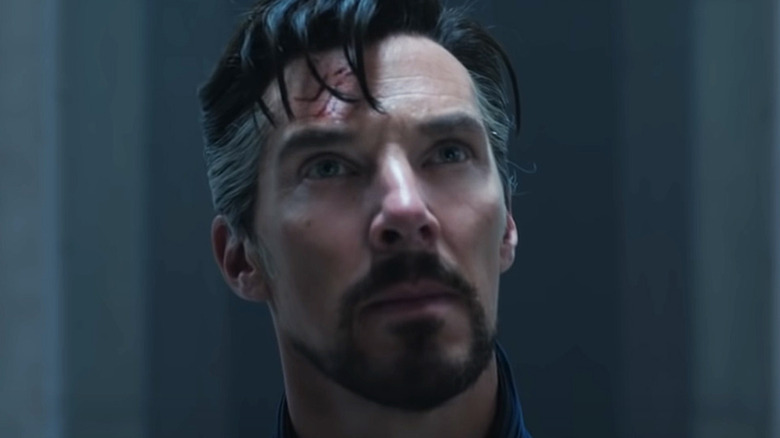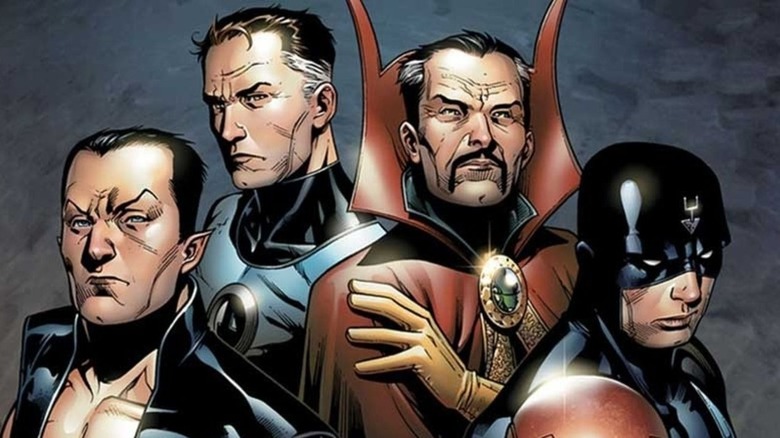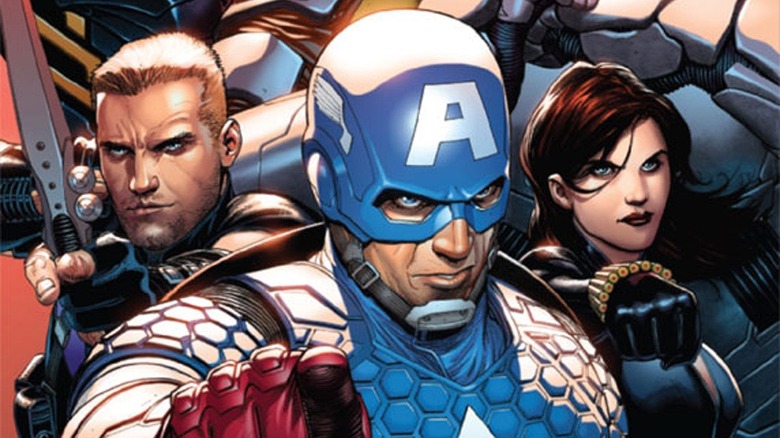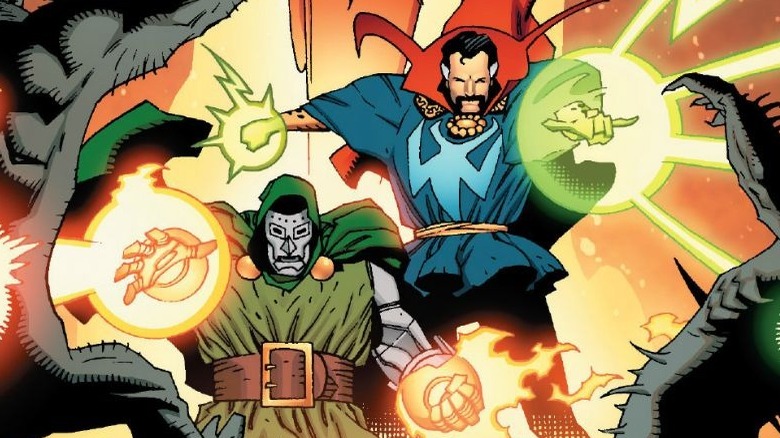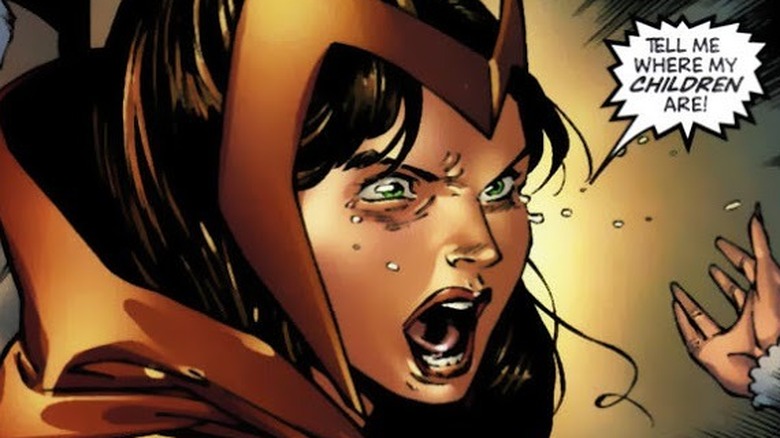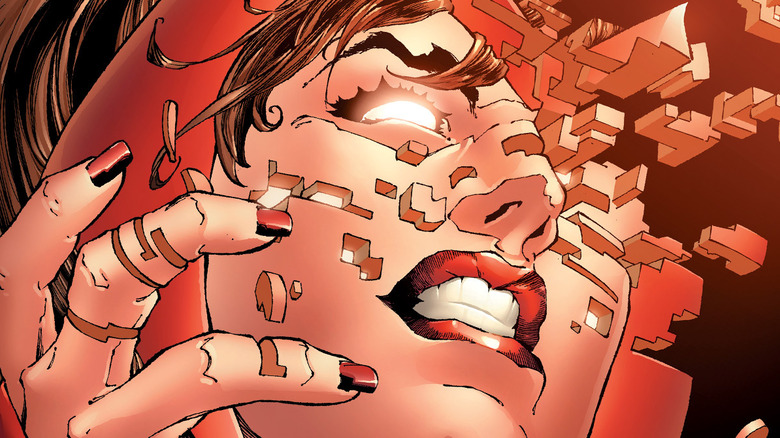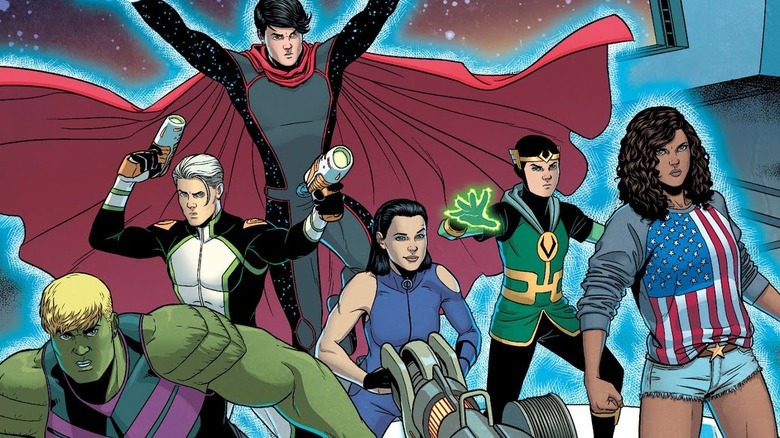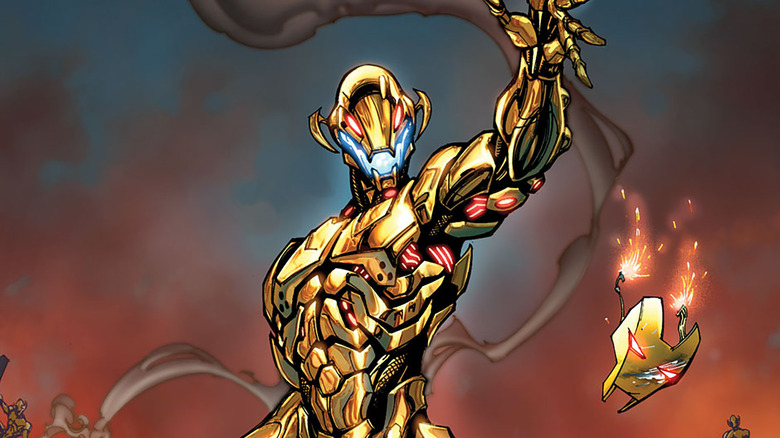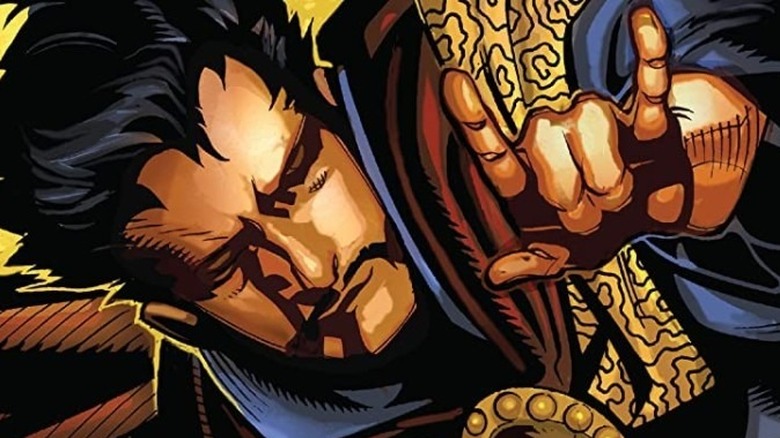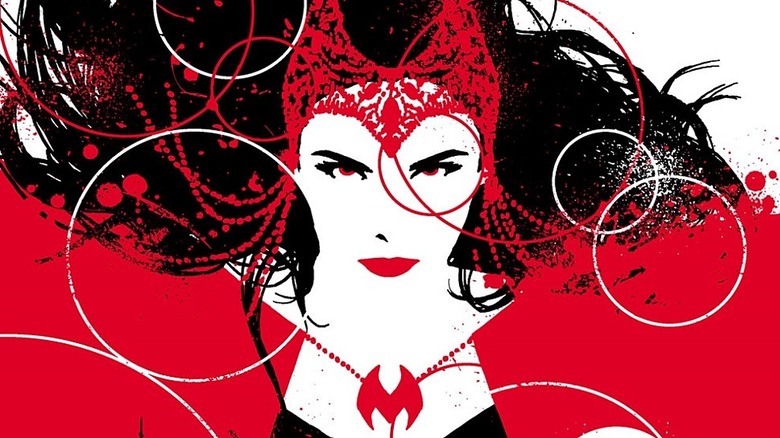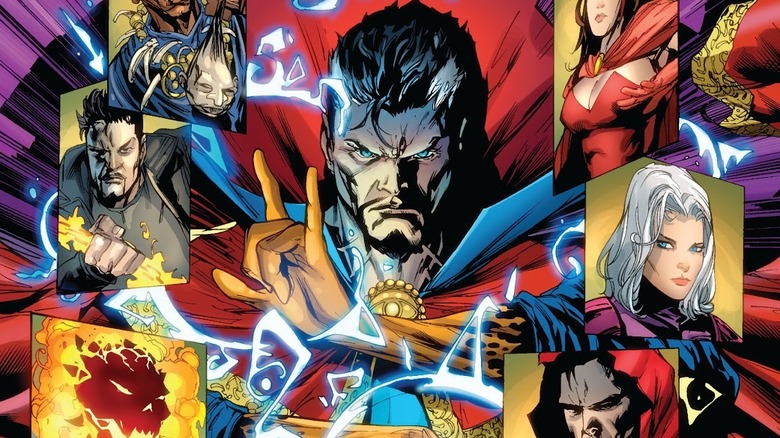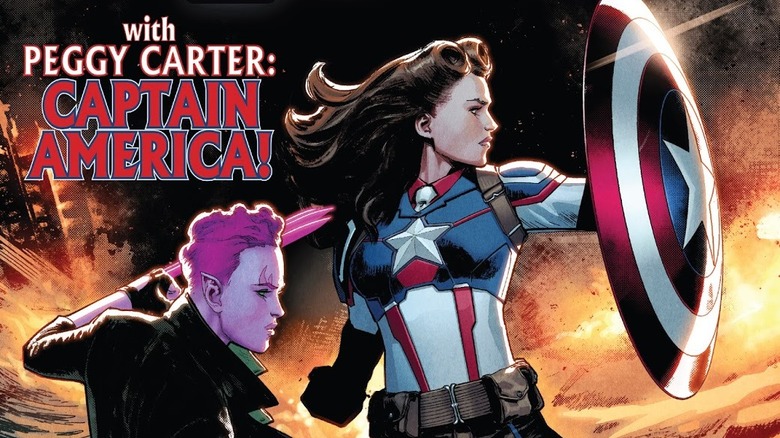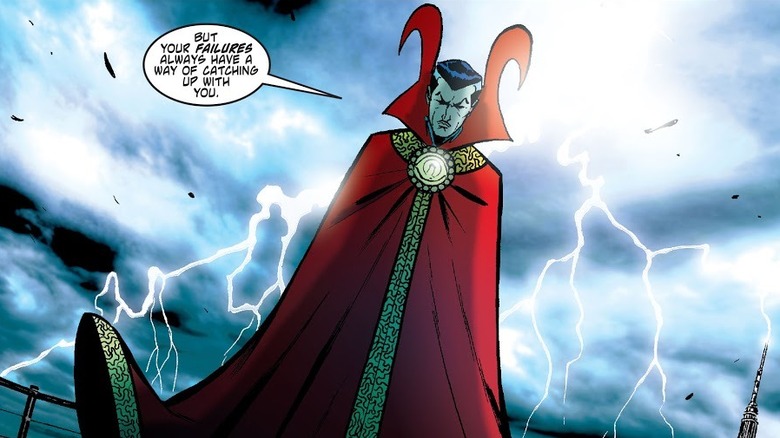Comics You Need To Read Before Seeing Doctor Strange In The Multiverse Of Madness
The Marvel Cinematic Universe has teased the introduction of the multiverse, an infinite web of alternate realities and joyously reimagined characters, for years. The "What If ... ?" anthology series plumbs the multiversal depths but leaves its canonicity in question. "Spider-Man: No Way Home" shatters the multiverse entirely — as well as the box office – but also does its best to repair the damage and recenter the one true reality. 2022's "Doctor Strange in the Multiverse of Madness," however, promises to bring the multiverse to the forefront of the MCU, in all its limitless potential.
There's no telling just how much "Multiverse of Madness" will alter the MCU, though its first trailers have already teased a few massive introductions. To prepare yourself for the psychedelic odyssey through time, space, and sorcery this film guarantees, a few Marvel Comics series are required reading. They're not just the good doctor's comics either, but also those starring characters likely to appear, and sundry other tales that explore the vast frontier that is the Marvel multiverse. These are the comics you need to read before seeing "Doctor Strange in the Multiverse of Madness."
The New Avengers: Illuminati
If there's one moment from the "Doctor Strange in the Multiverse of Madness" trailer that inspired the most rampant fan speculation, it's the one in which a handcuffed Strange is brought before a council of beings, one of whom insists that they should "tell him the truth." Though the speaker remains unseen, many fans believe the mellifluous voice is that of Sir Patrick Stewart, longtime portrayer of Professor Charles Xavier.
The possibilities inherent in the "Multiverse of Madness" premise exploded with this shadowy moment. If indeed the voice is Stewart's, then it's likely Xavier will be making his MCU debut. This, of course, would mean that mutants are about to be introduced into the MCU, and possibly those previously verboten 20th Century Fox characters.
This is exciting unto itself, but Xavier's presence on a council with seemingly supreme authority hints at another big introduction: Marvel's Illuminati. This secret geniocracy makes its debut in Brian Michael Bendis' historic "New Avengers" run. The Illuminati is made up of Earth's best and brightest heroes (including both Xavier and Strange), and meets to decide the planet's fate. The team later received their own spinoff, "The New Avengers: Illuminati," which is the perfect introduction to the group and its clandestine purpose.
Jonathan Hickman's Avengers
The Illuminati continue on after Bendis' departure from the "Avengers" series, remaining central to the overarching plot of writer Jonathan Hickman's "Avengers" and "New Avengers" runs. Hickman uses these two series to mastermind one of the largest and most consequential Marvel multiverse stories to date. Throughout the ongoing "Avengers" series, the many realities that (at this point) constitute the multiverse begin mysteriously disappearing. The Illuminati are among the first to discover the cause: an extra-dimensional, ultra-powerful race known as the Beyonders. They also discover the inevitable end to the universal disappearances. It all leads to the destruction of Earth — every Earth.
These two Avengers series are virtually guaranteed to influence the events of "Doctor Strange in the Multiverse of Madness" on some level. Hickman's "New Avengers" showcases the Illuminati at their best — or worst, depending on your opinions regarding sacrificing other realities to save one's own. What results is some of the most wild multiverse-sculpting any Marvel writer has ever been allowed to carry out. Hickman's twin series see reality break apart, and the Illuminati, with Doctor Strange as a core member, forced to do everything they can to stitch it back together.
Secret Wars
The 2015 "Secret Wars" event is the culmination of everything Jonathan Hickman builds in his "Avengers" and "New Avengers" series (as well as his criminally underrated run on "Fantastic Four"). With every Marvel universe finally destroyed, the entire Marvel timeline should, by all rights, have ended in silence and darkness. Luckily, several small slices of various universes are saved and conglomerated into a Frankenstein planet known as Battleworld. Its architects, and indeed the saviors of all reality, are Doctor Doom, the Molecule Man, and our own Doctor Strange.
If one multiversal event is required reading ahead of "Multiverse of Madness," it's the expertly crafted "Secret Wars." Not only does it dive deep into the innermost workings of the multiverse and feature a reality-shattering plot, it also prominently features Doctor Strange. As God Emperor Doom's most trusted advisor and right-hand man, Strange is given the title of Sheriff Strange and trusted with the protection of the planet (and, therefore, all reality). "Secret Wars" is most likely to influence the upcoming film's portrayal of Strange's morality. Having played a part in the multiverse's destruction and recreation, the "Secret Wars" Strange is humbled and burdened with crushing guilt — kind of like the MCU's Strange, post-"No Way Home."
Avengers Disassembled
Doctor Strange won't be alone in "Multiverse of Madness" — far from it, in fact. He's set to encounter multiple allies, enemies, and beings that fall somewhere in between. Judging from the movie's trailers, Wanda Maximoff will be one of the most important supporting characters. In "WandaVision," the Scarlet Witch establishes herself as both wildly powerful and intriguingly unpredictable. She could prove an important ally to Strange as he attempts to fix a fundamentally broken reality: Wanda's intimate relationship with chaos is certain to affect "Multiverse of Madness" somehow, and she's still basically a good guy. But things might also go terribly, terribly wrong.
The MCU isn't the first medium to see the Scarlet Witch's powers consume her, as they do in Westview. That honor goes to the 2004 event "Avengers Disassembled." Throughout this story, the Avengers are tested by an unprecedented barrage of threats, both external and internal. The combined effect results in the deaths of Hawkeye, Vision, Ant-Man, and others. Brought lower than ever and unable to make sense of this tragedy, the Avengers are on the verge of breaking up. Only Doctor Strange is able to deduce the root cause of their suffering: the Scarlet Witch. Years prior, she created a magical world in which she and Vision were happily married with twin children — sound familiar? Losing that blissful illusion is so traumatic, she's taking revenge on her teammates without entirely realizing it.
House of M
The story which begins in "Avengers Disassembled" continues in the legendary "House of M" event. Together, they're the one-two punch that cements Wanda as immeasurably powerful ... and somewhat unstable. As only Doctor Strange is able to discern, Wanda's magic has taken advantage of her grief and confusion to subconsciously escape her, bringing woe to those closest to her. As much damage as that does to the Avengers in "Disassembled," it doesn't even compare to the trauma it bestows upon Earth's mutants in "House of M."
Though Marvel canon has oscillated regarding the source of Wanda's powers, in "Avengers Disassembled" and "House of M," they come from her mutant X-gene. When these abilities lead to the death of her fellow Avengers, as well as multiple other incidents of cruelty and violence, Wanda begins to blame her mutant heritage. In a fit of rage, she says the three words that would define her for the next 20 years of comics: "No more mutants." In an instant, her magic causes over 90% of Earth's mutants to lose their powers. A population of millions becomes one of hundreds. "House of M" is a must-read for any fan curious about Wanda's destructive potential, and the futures potentially awaiting the MCU's mutants.
2013 Young Avengers
It has long been confirmed that "Multiverse of Madness" will introduce America Chavez, a wry, hard-hitting heroine with the power to create doorways between realities — quite a handy feature if you're looking to explore the multiverse. She's gone on quite a few adventures since her 2011 debut, but one of her finest hours is unquestionably found within 2013's "Young Avengers" series.
This run sees the titular team of adolescent heroes navigate a mystery that spans multiple realities, timelines, and alternate versions of themselves. The multiversal nature of the story and Chavez's prominence therein makes "Young Avengers" an obvious link to "Multiverse of Madness," but the connection between the series and movie may go even deeper than that. The young team's leader is Wiccan, aka Billy Kaplan, the Scarlet's Witch's reincarnated son, and its roster includes Speed, aka Tommy Shepherd, his reincarnated brother. As savvy fans know, both Billy and Tommy play major roles in "WandaVision" — and possibly the MCU's future.
Age of Ultron
If the possible reveal of the Illuminati is the "Multiverse of Madness" trailer's most noteworthy moment, then the inclusion of Ultron robots is its weirdest. As Strange is led to the council chambers, he is escorted by a quartet of robots that look strikingly similar to the ones Ultron creates in 2015's "Avengers: Age of Ultron." Their presence, especially as servants of Xavier and company, may seem initially baffling, but there could be a very good reason they're there.
The second Avengers movie is not the last time we saw Ultron, as he appears in "What If ... ?," gradually emerging as its greatest villain. The connections between Ultron, "What If ... ?," and "Multiverse of Madness" are numerous, and notably, all have their roots in Ultron's greatest comic moment: "Age of Ultron." This series takes place throughout the multiverse, and sees an ultra-powerful Ultron take control of Earth. It inspired events in "What If ... ?," which sees Ultron's robots spread across the multiverse. Given the fact that the dark Doctor Strange from "What If ... ?" will be in "Multiverse of Madness," it seems likely the anthology series is canon, will directly affect the new movie, and, most importantly, leave the MCU multiverse absolutely chock-full of Ultron's robots.
2015 Doctor Strange
The 2015 "Doctor Strange" series is, pun very much intended, a marvel. Jason Aaron, the same writer who made Jane Foster Thor and created Gorr the God Butcher, penned this run, while superstar artist Chris Bachalo brought it to visual life. Aaron has long captured the attention of Marvel's higher-ups, including MCU mastermind Kevin Feige, due to his stellar storytelling and fun reinvention of well-trodden characters. Betting that his take on the Sorcerer Supreme will influence "Multiverse of Madness" is a fairly safe choice.
Aaron's run could come to bear on "Multiverse of Madness" in a number of ways: It sees Strange's relationship with magic tested, explored, and even shattered completely. Crucially, one of his primary threats is a collection of beings bent on eliminating the multiverse's sorcerers, as they deem them too large of a threat to existence. This is, of course, the same goal held by Mordo, Chiwetel Ejiofor's character in 2016's "Doctor Strange," who is also confirmed to return in "Multiverse of Madness." Furthermore, the overarching theme of this run is the inherent danger and unpredictability of magic, a concern Strange proves valid in "Spider-Man: No Way Home." It seems likely the topic will be central to the plot of "Multiverse of Madness."
2015 Scarlet Witch
Of all the characters teased or confirmed for "Multiverse of Madness," the Scarlet Witch claims the most convoluted history. Aside from her dubious mutant-ness, there is also the matter of her imaginary children who eventually become real, her variable status as the daughter of Magneto, and much more. If there is any single easiest way to get to know Wanda Maximoff without combing through decades of comics, it's reading the phenomenal 2015 "Scarlet Witch" series written by James Robinson.
Wanda has seldom starred in her own solo series, almost always appearing instead as a member of one Avengers lineup or another. The chance to read a book focused solely on her is a rare treat. On top of that, this series manages to explore Wanda's magic and its history in a generally standalone way: New readers can jump into Wanda's life here without needing to read any lengthy primers. In fact, Wanda is even approached to join a blockbuster event during the series and politely declines, opting to continue getting to know herself better than ever before — a gift readers receive, also.
Search For The Sorcerer Supreme
Another important story to come from the pages of "New Avengers" is "Search for the Sorcerer Supreme," which sees Strange misuse magic and atone for his mistakes. Sound familiar? That's also poised to be the exact plot of "Multiverse of Madness." But even if these two tales end up being quite separate, "Search for the Sorcerer Supreme" still makes for an interesting read.
This arc, like so many on this list, begins with the Illuminati, who decide the Hulk is too much of a threat to peace and exile him to the far reaches of space. When the green machine inevitably returns, launching "World War Hulk," Strange, desperate to end the conflict, channels a demon for increased power. This type of dark magic is a strict no-no for the Sorcerer Supreme, and so when Strange resorts to using the magic again in the pages of "New Avengers," he renounces his title. Thus, the titular search begins. Strange approaches a who's-who of Marvel magic users, seeking a suitable replacement. Though "Spider-Man: No Way Home" confirms that the MCU Strange has already lost the title of Sorcerer Supreme, due to being blipped out of existence for five years, he is nonetheless about to face a similar journey of guilt and comeuppance.
2018 Exiles
Marvel's various "Exiles" teams have always been misfits, both in terms of their canonical histories and their place in the Marvel publishing lineup. The team, which consists of heroes plucked from various realities, has always had a hard time fitting into the larger Marvel universe, for fairly obvious reasons. However, given the current focus the MCU is placing on multiversal stories, the Exiles are more relevant than ever. Their lastest incarnation seems particularly likely to influence "Multiverse of Madness" — the question is, how much.
The 2018 "Exiles" series, written by Saladin Ahmed and drawn by Javier Rodriguez, will affect the movie in at least one way: Captain Carter will be present. This series was the first to feature Peggy Carter as an alternate universe's answer to Captain America, years before she made her debut in "What If ... ?" This version of Carter fights against Ultron alongside the dark Doctor Strange in order to save the multiverse. Given dark Doctor Strange and Ultron's robots will definitely appear in "Multiverse of Madness," the film and this "Exiles" comic series have a direct link. Should that link strengthen even more in the form of Captain Carter's presence in "Multiverse of Madness," it's likely Marvel fandom will explode in celebration.
Doctor Strange: The Oath
Of the hundreds of "Doctor Strange" comics in existence, a few stand out as especially masterful portrayals of the character and his world. One such success is 2006's "Doctor Strange: The Oath," a miniseries written by the legendary Brian K. Vaughan and penciled by the superb Marcos Martin. Over the course of Strange's long history, the character has worn many cloaks: He's been a warlock, a warrior, a healer, and a hermit. But the one that suits him best is the one he wears throughout "The Oath" — that of a supernatural detective whose wizardry is secondary to his wit.
Strange tackles two major problems in "The Oath": Figuring out who attempted to murder him, and curing Wong's terminal cancer. One of this series' most influential details is the kinship it portrays between Strange and Wong. Previous comics show them as close, but "The Oath" makes it clear that their relationship is less master-servant than it is brother-brother, a connection the MCU has continued. Likewise, "The Oath" pits Strange's humanity against his egotism, forcing him to choose between repairing his own gunshot wound, Wong's cancer, and the world itself. The MCU has done an excellent job exploring the conflict between morality and pride as the backbone of Strange's character. And really, despite the secret cabals, alternate realities, and magical wars present, the one thing fans want from "Doctor Strange in the Multiverse of Madness" is, well, Doctor Strange. "The Oath" offers that in spades.
